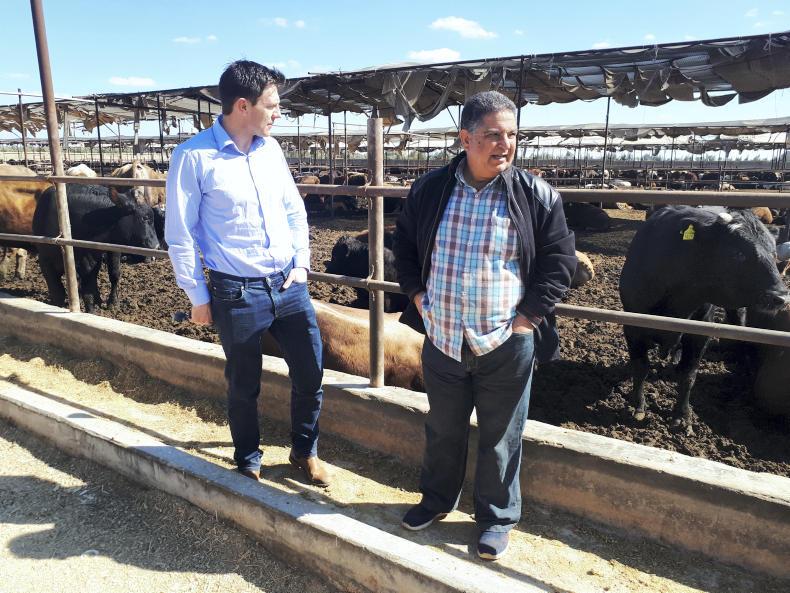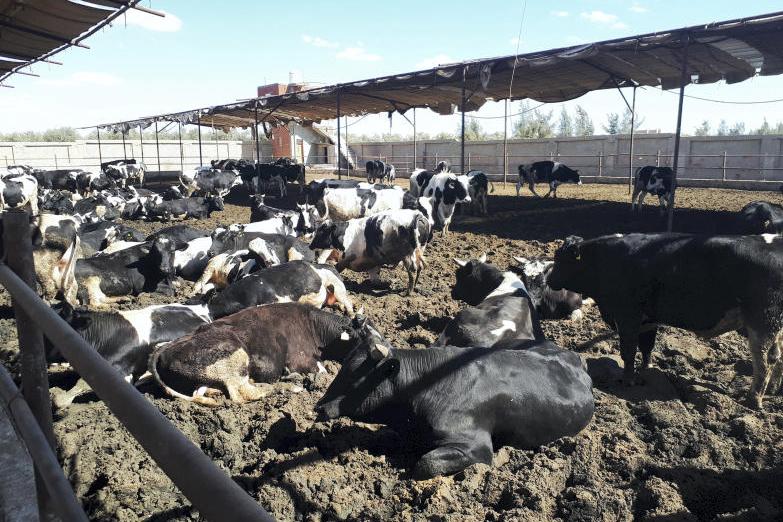Abderaouf Al Gohary farms near West Menofia in Northern Egypt. It’s about a three-hour car journey northwest of Cairo, heading for Alexandria.
Dr Gohary imported 2,000 beef bulls from Brazil. They are a mix of breeds, with many crossbreds and pure-dairy bull calves. They were bought between 250kg and 300kg liveweight with the intention of slaughtering from 500kg to 550kg liveweight in advance of Ramadan in mid April. We understand the cost of the bulls was in the region of US$2.40/kg landed into the farm in Egypt.
Abderaouf Al Gohary near el Khatatba Road, West Menoufia in Egypt.
He is finishing them on a diet of maize silage and alfalfa, much of which is also imported from South America.

The Brazilian bulls are coralled on sand beds with shade over the feed face to keep the exterme sun away in the middle of the day.
As we drove to the farm we passed desert as far as the eye could see. When we got closer, we saw fields of grapes, oranges, lemons, vegetables and bananas. February is classed as winter in Egypt, even though it’s 24°C.

Nothing fancy about the breeds: there is a mix of Jersey, Brown Swiss, Angus, Holsteins and crossbreds of other breeds.
Gohary showed us around his two dairy farms and this beef farm. Essentially all the bulls are out in open air sand corrals. There was some sun shade over the area around the feed face and at the back of the sand pens. The bulls had access to a TMR diet at the feed face and water at all times.

Bulls standing in the sun shade.
The dairy-bred bull calves from his own dairy herd are also kept for fattening. The plan is to get them to 500kg at 12 months of age. If we assume 40kg birthweight, it suggests an average of 1.25kg per day weight gain from birth to slaughter. Gohary reckoned some of the Brazilian bulls were doing 1.5kg to 2kg weight gain per day at the moment. No artificial hormones are used to boost weight gain.

The bulls were purchased at between 250 and 300kg liveweight.
The key to profit for Gohary is timing his run with the finished animals. Ramadan runs from 23 April to 23 May this year and the objective of Gohary is to hit the market with this beef in the weeks leading up to it. He said: “I’m storing them now rather than pushing them on. Some are leaving to be slaughtered locally in small numbers already, but the majority won’t go until we get closer to Ramadan.”

Abderaouf Al Gohary (right) and Joe Burke of Bord Bia standing in front of the 2,000 dairy-bred bulls imported from Brazil into Egypt.
Every year there is a big beef demand and price rise for this annual month of worship in the Muslim calendar. Egyptians who can afford meat buy meat to give to other Egyptians and demand spikes.
Gohary said he’s getting a 20% return on investment in his beef enterprise.

Finishing bulls on the farm.
This visit was part of the trade mission led by Bord Bia to Egypt this week aimed at building stronger links between Irish cattle exporters and Egyptian cattle buyers. See more on farmersjournal.ie and in this week’s Irish Farmers Journal.
Read more
Egyptian food demand soaring
Population growth driving Bord Bia Algeria trade mission
Abderaouf Al Gohary farms near West Menofia in Northern Egypt. It’s about a three-hour car journey northwest of Cairo, heading for Alexandria.
Dr Gohary imported 2,000 beef bulls from Brazil. They are a mix of breeds, with many crossbreds and pure-dairy bull calves. They were bought between 250kg and 300kg liveweight with the intention of slaughtering from 500kg to 550kg liveweight in advance of Ramadan in mid April. We understand the cost of the bulls was in the region of US$2.40/kg landed into the farm in Egypt.
Abderaouf Al Gohary near el Khatatba Road, West Menoufia in Egypt.
He is finishing them on a diet of maize silage and alfalfa, much of which is also imported from South America.

The Brazilian bulls are coralled on sand beds with shade over the feed face to keep the exterme sun away in the middle of the day.
As we drove to the farm we passed desert as far as the eye could see. When we got closer, we saw fields of grapes, oranges, lemons, vegetables and bananas. February is classed as winter in Egypt, even though it’s 24°C.

Nothing fancy about the breeds: there is a mix of Jersey, Brown Swiss, Angus, Holsteins and crossbreds of other breeds.
Gohary showed us around his two dairy farms and this beef farm. Essentially all the bulls are out in open air sand corrals. There was some sun shade over the area around the feed face and at the back of the sand pens. The bulls had access to a TMR diet at the feed face and water at all times.

Bulls standing in the sun shade.
The dairy-bred bull calves from his own dairy herd are also kept for fattening. The plan is to get them to 500kg at 12 months of age. If we assume 40kg birthweight, it suggests an average of 1.25kg per day weight gain from birth to slaughter. Gohary reckoned some of the Brazilian bulls were doing 1.5kg to 2kg weight gain per day at the moment. No artificial hormones are used to boost weight gain.

The bulls were purchased at between 250 and 300kg liveweight.
The key to profit for Gohary is timing his run with the finished animals. Ramadan runs from 23 April to 23 May this year and the objective of Gohary is to hit the market with this beef in the weeks leading up to it. He said: “I’m storing them now rather than pushing them on. Some are leaving to be slaughtered locally in small numbers already, but the majority won’t go until we get closer to Ramadan.”

Abderaouf Al Gohary (right) and Joe Burke of Bord Bia standing in front of the 2,000 dairy-bred bulls imported from Brazil into Egypt.
Every year there is a big beef demand and price rise for this annual month of worship in the Muslim calendar. Egyptians who can afford meat buy meat to give to other Egyptians and demand spikes.
Gohary said he’s getting a 20% return on investment in his beef enterprise.

Finishing bulls on the farm.
This visit was part of the trade mission led by Bord Bia to Egypt this week aimed at building stronger links between Irish cattle exporters and Egyptian cattle buyers. See more on farmersjournal.ie and in this week’s Irish Farmers Journal.
Read more
Egyptian food demand soaring
Population growth driving Bord Bia Algeria trade mission












 This is a subscriber-only article
This is a subscriber-only article










SHARING OPTIONS: